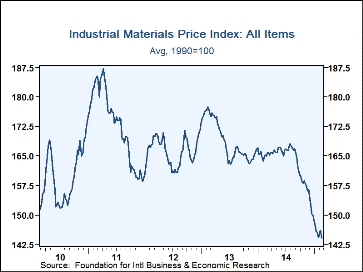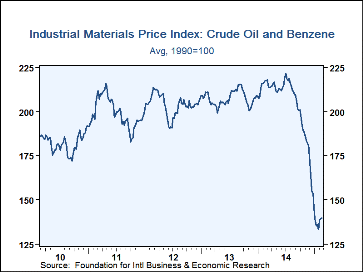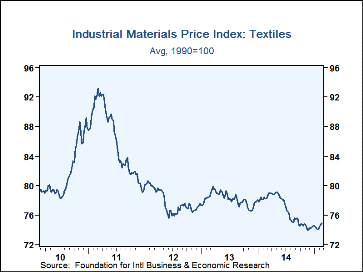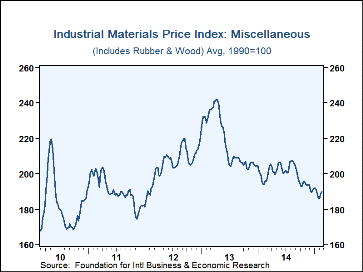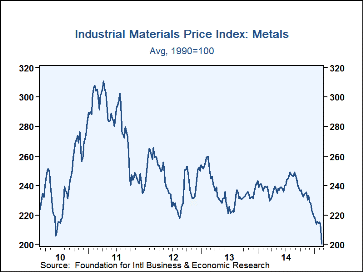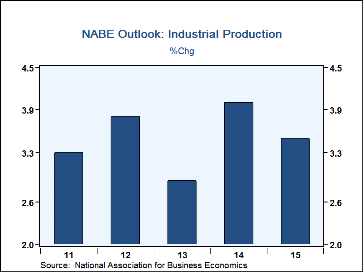 Global| Feb 20 2015
Global| Feb 20 2015FIBER: Industrial Commodity Prices Stabilize
by:Tom Moeller
|in:Economy in Brief
Summary
The industrial commodity price index from the Foundation for International Business and Economic Research (FIBER) improved slightly during the last five weeks following declines which total 13.1% during the last year. The crude oil & [...]
The industrial commodity price index from the Foundation for International Business and Economic Research (FIBER) improved slightly during the last five weeks following declines which total 13.1% during the last year.
The crude oil & benzene grouping led the improvement with a 3.5% rise since late-January. The price for a barrel of WTI crude oil rallied to $50.50 as of yesterday from its January low of $45.04. Prices reached $53.14 on Tuesday. The same cannot be observed for the petro-chemical benzene where prices reached a new low last week (-62.2% y/y). Prices in the textile sector also improved 1.8% during the last month. Cotton prices led the gain with a 13.0% rise from the low (-23.3% y/y). In the miscellaneous materials grouping, prices improved 2.6% (-3.1% y/y) since the low earlier this month. Natural rubber prices led the way higher with a 13.2% rise (-14.5% y/y) since the January low. Structural panel prices notched slightly higher this month and have improved 6.7% versus last year. Prices for framing lumber, however, remain weak (-6.9% y/y), reaching the lowest level since 2013. In the metals sector, prices remain weak. The 17.2% y/y decline has left the index level at its lowest point since July 2009. Steel scrap prices led the way lower with a 39.4% y/y decline and they are down by nearly one-half from the 2011 high. Copper scrap prices have been similarly weak, posting a 43.0% decline from the 2011 high (-21.2% y/y). Aluminum prices have weakened 13.7% since the late-November high but they remain up 4.0% y/y.
Future support for commodity prices may be on the way. The current industrial output projection from the National Association for Business Economics calls for 3.5% growth in industrial production in 2015. During the last ten years, there has been a 52% correlation between the three-month change in prices and the change in industrial output.
Commodity price data can be found in Haver's DAILY, WEEKLY, USECON and CMDTY databases.
| FIBER Industrial Materials Price Index (1990=100) | 2/19/15 | Y/Y % | 2014 | 2013 | 2012 |
|---|---|---|---|---|---|
| All Items | 143.76 | -13.1 | 163.5 | 169.0 | 166.3 |
| Textiles | 75.16 | -3.9 | 76.8 | 78.2 | 77.8 |
| Cotton (cents per pound) | 63.66 | -23.3 | 73.6 | 79.6 | 74.4 |
| Metals | 199.24 | -17.2 | 237.8 | 236.2 | 242.7 |
| Aluminum ($ per metric ton) | 1,795.0 | 4.0 | 1,864.9 | 1,846.7 | 2,016.6 |
| Copper Scrap (cents per pound) | 258.0 | -21.2 | 311.7 | 332.3 | 360.3 |
| Steel Scrap ($ per ton) | 226.67 | -39.4 | 358.3 | 345.8 | 366.5 |
| Crude Oil & Benzene | 138.49 | -36.6 | 205.2 | 207.7 | 204.0 |
| Crude Oil (WTI, $ per Barrel) | 50.50 | -51.1 | 93.5 | 97.9 | 94.2 |
| Miscellaneous | 189.67 | -3.1 | 199.6 | 218.3 | 205.2 |
| Framing Lumber ($ per 1000 board ft.) | 362 | -6.9 | 383 | 383 | 321 |
| Natural Rubber (cents per pound) | 136.74 | -14.5 | 140.2 | 190.0 | 211.8 |
Tom Moeller
AuthorMore in Author Profile »Prior to joining Haver Analytics in 2000, Mr. Moeller worked as the Economist at Chancellor Capital Management from 1985 to 1999. There, he developed comprehensive economic forecasts and interpreted economic data for equity and fixed income portfolio managers. Also at Chancellor, Mr. Moeller worked as an equity analyst and was responsible for researching and rating companies in the economically sensitive automobile and housing industries for investment in Chancellor’s equity portfolio. Prior to joining Chancellor, Mr. Moeller was an Economist at Citibank from 1979 to 1984. He also analyzed pricing behavior in the metals industry for the Council on Wage and Price Stability in Washington, D.C. In 1999, Mr. Moeller received the award for most accurate forecast from the Forecasters' Club of New York. From 1990 to 1992 he was President of the New York Association for Business Economists. Mr. Moeller earned an M.B.A. in Finance from Fordham University, where he graduated in 1987. He holds a Bachelor of Arts in Economics from George Washington University.
More Economy in Brief
 Global| Feb 05 2026
Global| Feb 05 2026Charts of the Week: Balanced Policy, Resilient Data and AI Narratives
by:Andrew Cates


